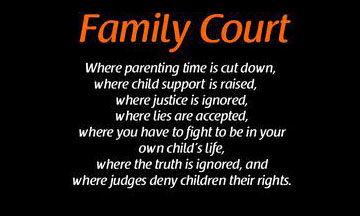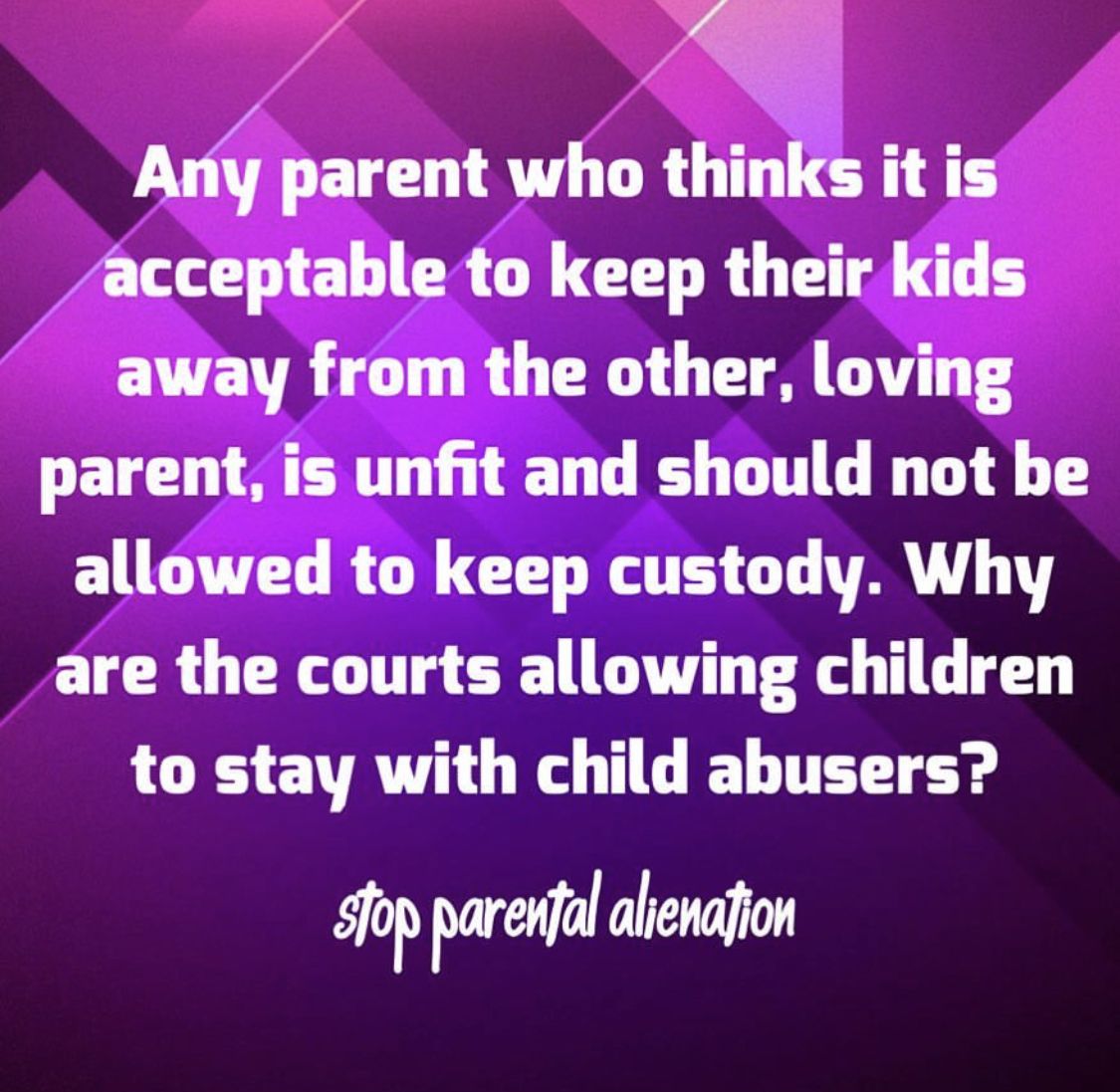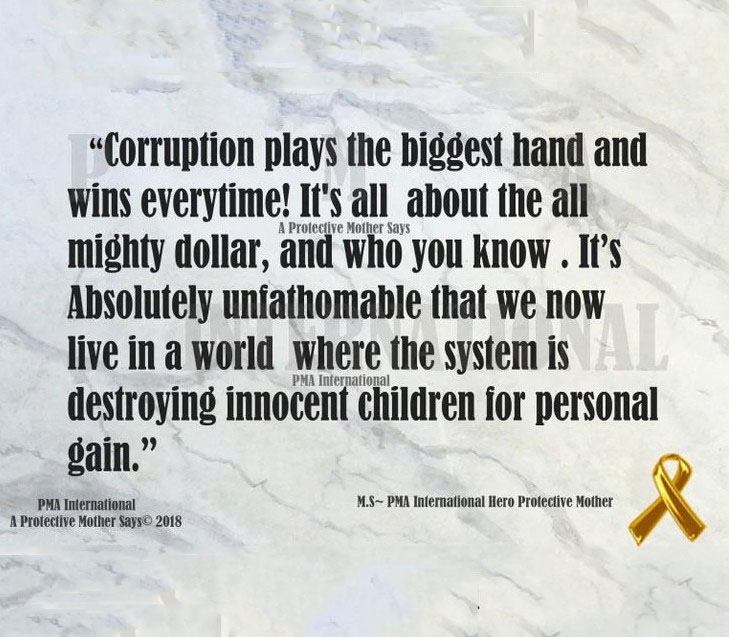


I firmly believe in support groups, a good support group will help you get your strength and sanity back. At this time, I do not think there are any person to person support groups. I am reaching out to my local mental health groups letting them know this is an issue that needs to be addressed. As a grandmother I am pushing for the county Dept. of Aging to start a group.
There are some Facebook people/groups I follow, I have found the following are advocating and making a difference – Robert Garza, public figure – PA. State Representative Jamie Flick – National Parents Organization – The Anti-Alienation Project
Dates to Know
April – Child Abuse national Awareness month
April 25th – Parental Alienation Awareness day
June 14th – Grandparent Alienation Awareness day
June 15 – Elder Abuse Awareness day
Nov. - Family Court Awareness month
Family court can harm alienated children in several ways, especially when it mishandles parental alienation, which involves one parent attempting to turn the child against the other parent. Here are some ways family court systems may unintentionally harm children caught in this situation:
1. Lack of Proper Understanding of Parental Alienation
Misdiagnosis or Disregard: In some cases, family court judges or therapists may not recognize or fully understand the signs of parental alienation. They might misinterpret the child's resistance to contact with a parent as an independent choice or result of abuse, rather than a sign of manipulation by the alienating parent. This can lead to decisions that further isolate the child from the targeted parent.
Inadequate Psychological Evaluation: Courts may not have sufficient expertise or resources to properly assess the psychological dynamics at play, leading to superficial assessments that fail to address the underlying alienation.
2. Forcing Contact Before the Child is Ready
Court Orders to Enforce Contact: Family courts may issue orders for the child to spend time with the alienated parent, even if the child is resistant or fearful. This can escalate the child’s emotional distress, especially if the alienation has been severe, and can lead to further harm. The child may feel forced to betray the emotional relationship they have with the alienating parent, causing confusion, anxiety, and trauma.
Lack of Sensitivity to Child’s Emotional State: Children who are in the midst of alienation may feel torn, guilty, or unsafe if forced to reunite with a parent they’ve been led to believe is harmful or untrustworthy. Courts often focus on enforcing the parent-child contact, but they may not always take the child's emotional readiness or wellbeing into account.
3. Re-traumatization
Courtroom Stress: Children who are forced to testify or are involved in hearings may experience trauma from the stress of participating in legal proceedings. The environment in family court can be adversarial and emotionally charged, which can lead to further anxiety or a sense of being caught in the middle of the conflict.
Exposing the Child to High-Conflict Situations: If the court is not equipped to address parental alienation, it may inadvertently expose the child to further conflict, as both parents continue to battle for custody or influence. This constant exposure to parental conflict can be emotionally damaging for the child.
4. Unclear or Inconsistent Decisions
Inconsistent Enforcement of Court Orders: If family courts issue conflicting or unclear orders regarding custody or visitation, the child may be placed in an inconsistent environment where they feel unsafe, confused, or unsupported. The child may also experience a lack of continuity in their relationship with both parents.
Failure to Provide Long-Term Solutions: Family courts sometimes focus on short-term solutions that don't address the root cause of the problem (e.g., alienation). This can lead to repetitive cycles where the child is exposed to emotional harm over time without any real resolution or healing.
5. Potential Reinforcement of Alienation
Alienating Parent's Continued Influence: In some cases, the court may fail to intervene or may fail to take strong enough action against the alienating parent. If the alienating parent is not held accountable, they can continue to manipulate the child and perpetuate the cycle of alienation. This can make it more difficult for the targeted parent to re-establish a healthy relationship with the child.
Unintended Validation of Alienating Parent's Behavior: If the court appears to side with the alienating parent, even inadvertently, it can send a message to the child that their feelings and beliefs about the alienated parent are validated, even if those beliefs are based on manipulation. This can reinforce the alienation and complicate any efforts to restore the child's relationship with both parents.
6. Damage to Long-Term Relationship with Both Parents
Damaging Trust: Family courts can sometimes foster an environment where the child loses trust in one or both parents, especially if they are forced to navigate conflicting loyalties or are put in the position of "choosing sides." Over time, this can affect the child’s ability to form healthy, trusting relationships in general, even as they grow older.
Impact on Identity Development: Children, especially as they approach adolescence, are forming their identities. Parental alienation, if not addressed, can interfere with the child’s ability to have a balanced understanding of who they are in relation to both parents. This can lead to confusion and long-term struggles with self-esteem and relationships.
7. Failure to Address the Root Cause (Alienating Parent's Behavior)
Alienating Parent Not Held Accountable: Courts may focus on the child’s behavior and fail to examine or address the behavior of the alienating parent. This can allow the alienation to continue unchecked, prolonging the child’s suffering.
Failure to Provide Therapeutic Interventions: In some cases, the court might not provide adequate access to therapeutic support, such as counseling for the child or family therapy, which could help address the emotional and psychological issues related to the alienation.
8. No Consideration of Child's Developmental Stage
Not Taking Into Account the Child’s Age and Needs: Children of different ages have different emotional needs and capacities to understand or cope with conflict. Family courts may not always take into account how parental alienation affects children at different developmental stages. Younger children may be more easily influenced by an alienating parent, while older children may have more complex feelings of loyalty, guilt, or resentment.
How to Improve This Situation
Specialized Training for Judges and Attorneys: Judges and family court professionals need specialized training in recognizing and addressing parental alienation.
Collaborative and Therapeutic Approaches: Family courts can adopt more collaborative approaches that prioritize the child's mental and emotional wellbeing, such as using family therapy, specialized parenting coordinators, and child specialists who can help mediate and guide the process.
Enforcing Consequences for Alienating Behavior: Courts need to adopt more robust enforcement measures for parents who engage in alienating behaviors, including counseling, supervised visitation, or in extreme cases, a change in custody.
In short, family court can harm alienated children if it doesn't fully understand or address the dynamics of parental alienation. The system can often exacerbate the trauma and confusion a child experiences when it forces them into situations where their emotional needs and psychological safety are not prioritized.


